
Woodpeckers are birds you may commonly see around your home. While they can be enjoyable to watch, they can cause noise and damage to your property. You may be wondering how to keep woodpeckers away without causing them any harm. This article will discuss some environmentally friendly ways to keep pesky woodpeckers away. We’ll look at using natural smells they dislike!
Woodpeckers
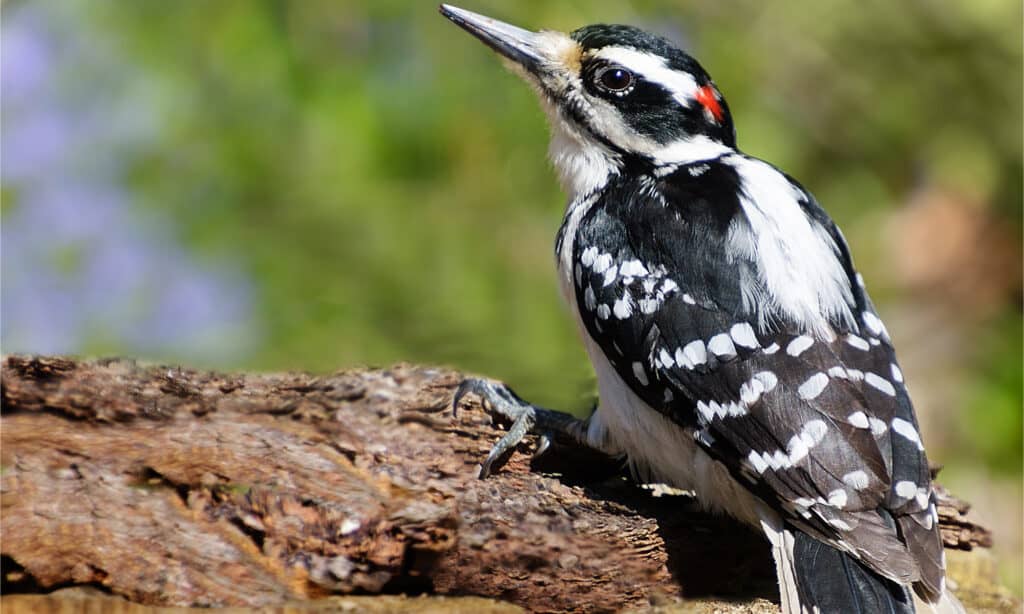
Hairy woodpeckers are endemic to North America.
©K Quinn Ferris/Shutterstock.com
Woodpeckers are birds that belong to the family Picidae. Around 300 species of woodpeckers are found worldwide in forests, woodlands, and even urban areas. They range in size from the acorn woodpecker, which is only 8 inches long, to the massive 24-inch-long imperial woodpecker, which was once considered extinct but may still exist in Mexico.
Woodpeckers have substantial bills for drilling into tree bark to find food or make nests. Their feet are also distinctive as they have two toes pointing forward and two toes pointing backward, which helps them grip tree trunks.
Most species of woodpecker have bright plumage with bold patterns. Woodpeckers eat primarily insects, but they will also eat fruits, nuts, and other small animals. They use their long tongues to reach deep into crevices in trees to get their prey. Some species of woodpecker may even store food in caches.
Why Don’t You Want Woodpeckers?
Woodpeckers can be a real nuisance and can cause much damage to your home. They peck at wood, siding, and even metal, which can create holes and damage the structure of your home. In addition, their droppings can stain and discolor your home’s exterior. Woodpeckers are also known to make a lot of noise, which can be quite disruptive. Their constant pecking can be loud and echo through your neighborhood. This can make it difficult to enjoy the peace and quiet of your own home, and it can also disturb your neighbors.
Smells That Woodpeckers Hate
An environmentally friendly and natural way to deter woodpeckers is to use smells that deter them rather than harsh chemicals. Here are some familiar smells that woodpeckers hate.
Peppermint

When
peppermint oil
is diffused into the air, it creates a strong, minty smell that deters woodpeckers away.
©Madeleine Steinbach/Shutterstock.com
Woodpeckers hate the smell of peppermint because it is a natural repellent for them. When peppermint oil is diffused into the air, it creates a strong, minty smell that deters woodpeckers away.
To deter woodpeckers, you can diffuse the peppermint oil into the air around your home or apply it directly to surfaces where woodpeckers are pecking. You can also find pre-made products that contain peppermint oil, such as bird deterrent sprays or granules.
Catnip
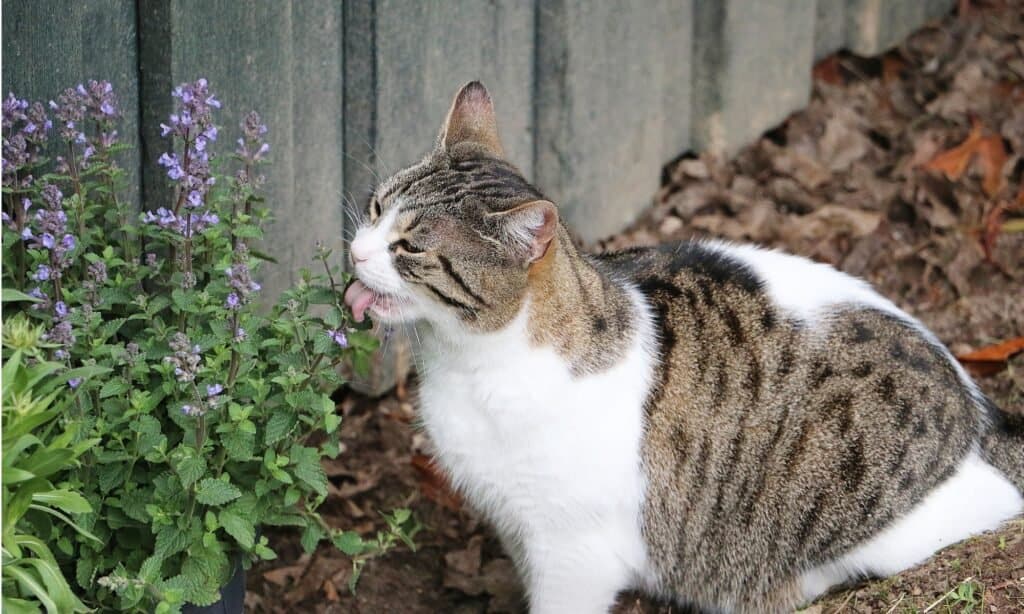
Catnip can be intense and overwhelming for woodpeckers.
©iStock.com/BiancaGrueneberg
Woodpeckers hate the smell of catnip because it can be intense and overwhelming for the bird.
You can use this smell to deter woodpeckers in various ways. One such method is to put some catnip in a spray bottle and spray it around the affected areas. Another method is to place small sachets of dried catnip around your property or even plant catnip plants around the outside of your home. Most pet stores should carry it if you’re looking for a place to purchase catnip. You can also easily find it online.
Cinnamon
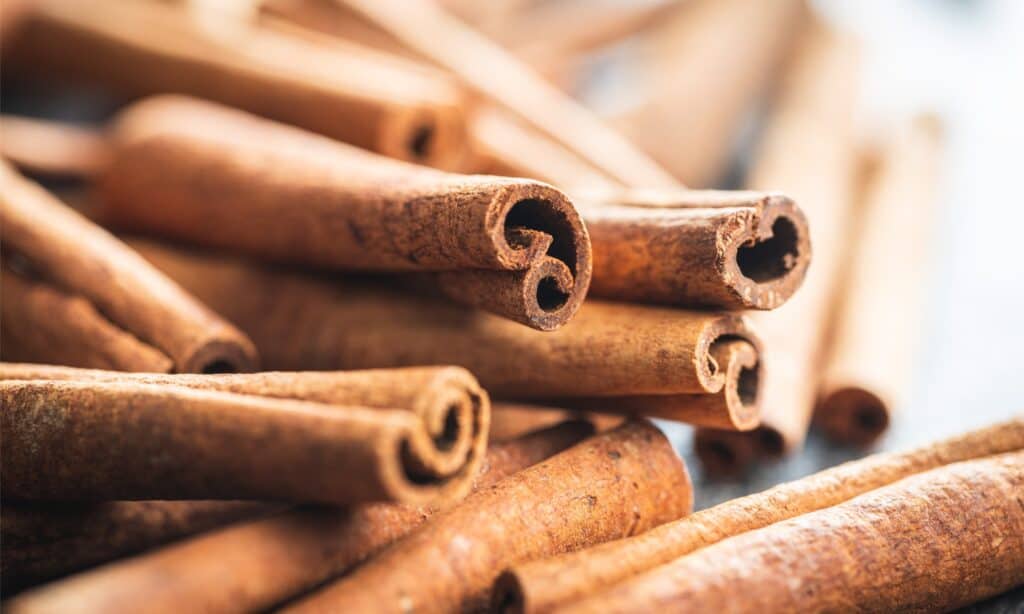
This spice can be found at most grocery stores in the spice aisle and is relatively inexpensive.
©iStock.com/jirkaejc
Cinnamon is another smell that woodpeckers may not like to be around. The taste of cinnamon also deters them, so if they were to peck at your house or tree, they would not enjoy the experience.
You can use this smell to deter woodpeckers by putting a few drops of essential oil on a cotton ball and placing it near where the woodpecker is causing damage. You can also sprinkle cinnamon around the area or even put some in a spray bottle and mist the area. Cinnamon can be found at most grocery stores in the spice aisle and is relatively inexpensive.
Lavender

Lavender deters woodpeckers by creating a scent barrier around the perimeter of your home.
©iStock.com/htmSana
Lavender oil can deter woodpeckers from your property by creating a scent barrier around the perimeter of your home or garden. The lavender smell overpowers other scents, masking potential food sources. This will help keep woodpeckers away from your house and prevent them from causing any more damage.
Lavender oil can be found at most health food stores or even online. You can plant the lavender plant itself around your home or use it as a spray. Add a few drops of lavender oil to a spray bottle filled with water and mist the area in your home or garden you want to protect.
Basil
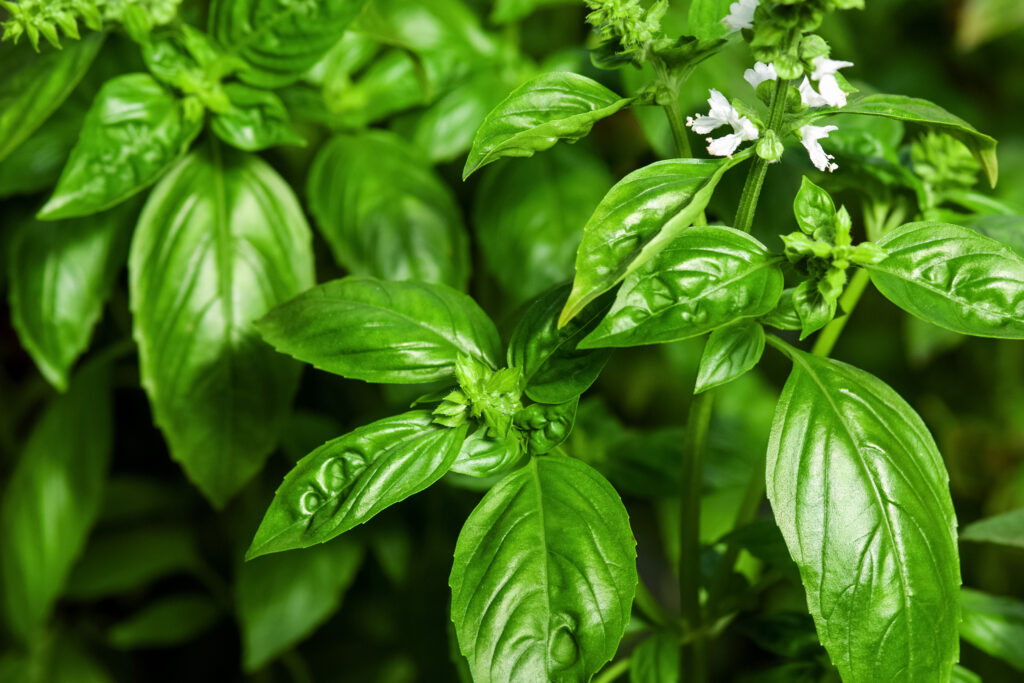
Basil is a natural repellent for many insects, so woodpeckers may associate the smell with something that will keep them away from their food source.
©Nadya So/Shutterstock.com
Woodpeckers hate the smell of basil for a few reasons. First, the strong scent is overwhelming and confusing to them. Second, basil is a natural repellent for many insects, so woodpeckers may associate the smell with something that will keep them away from their food source.
You can use this information to deter woodpeckers from your property in several ways. For example, you could plant basil around your home or garden. You can also make a spray using essential oils or boiled basil leaves in water and spritz it around areas where woodpeckers are likely to congregate (like trees or bird feeders). You can also try hanging strips of fabric soaked in basil oil to protect certain areas.
Rosemary
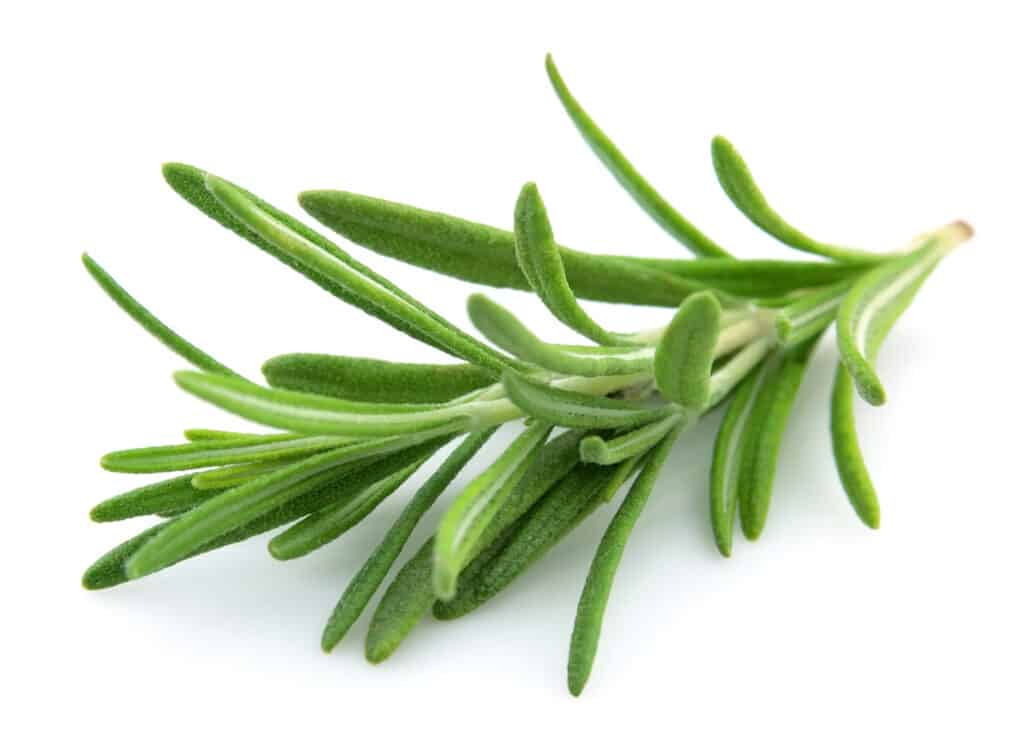
Rosemary is a potent aromatic herb that woodpeckers may find unpleasant.
©iStock.com/Volosina
Another scent that woodpeckers find unpleasant is rosemary. Rosemary is a potent, aromatic herb, and woodpeckers are very sensitive to smells. So, when they detect the scent of rosemary, they might avoid the area.
You can use this to your advantage by placing bundles of fresh rosemary leaves or oil near areas where woodpeckers are a nuisance. This may deter them from coming into contact with your property or home. Fresh rosemary is usually found at most grocery stores in the produce section or as a dried herb.
Citronella
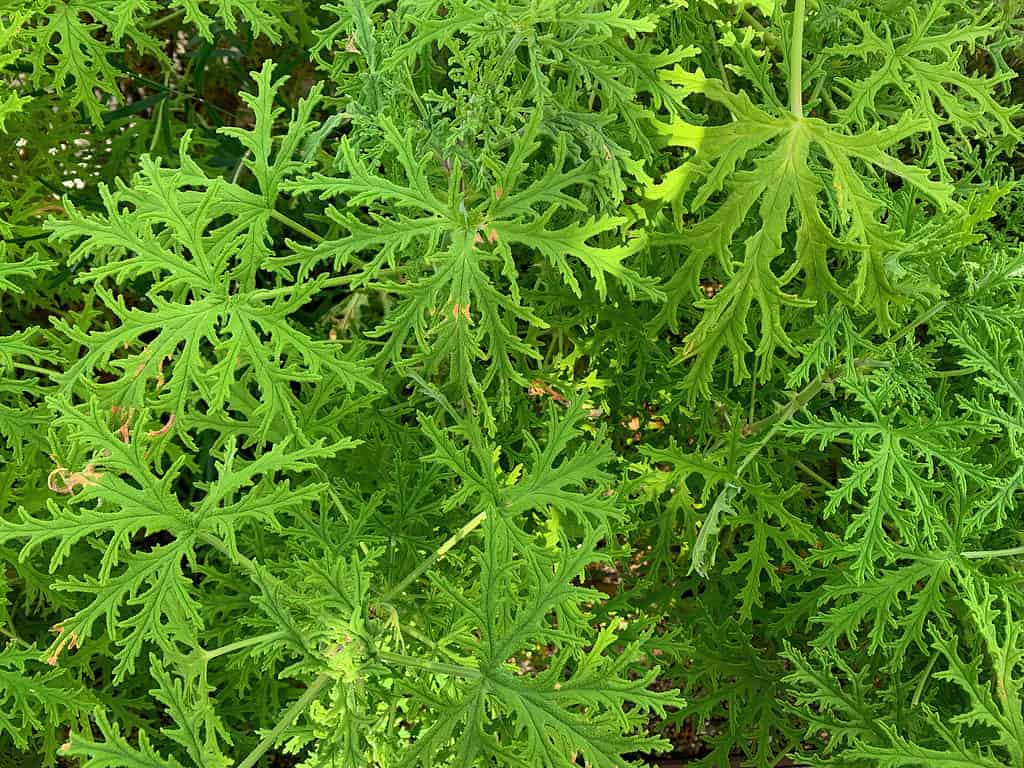
Citronella has bright green leaves.
©iStock.com/PotatoeHead
Woodpeckers hate the smell of citronella. This is because citronella is a natural, overwhelming repellent for many pests, including woodpeckers.
You should use citronella to deter woodpeckers for a few reasons. First, citronella is a very effective repellent. Second, it is relatively safe to use around humans and animals, and finally, it is readily available at most hardware, outdoor, and homeware stores.
Onion
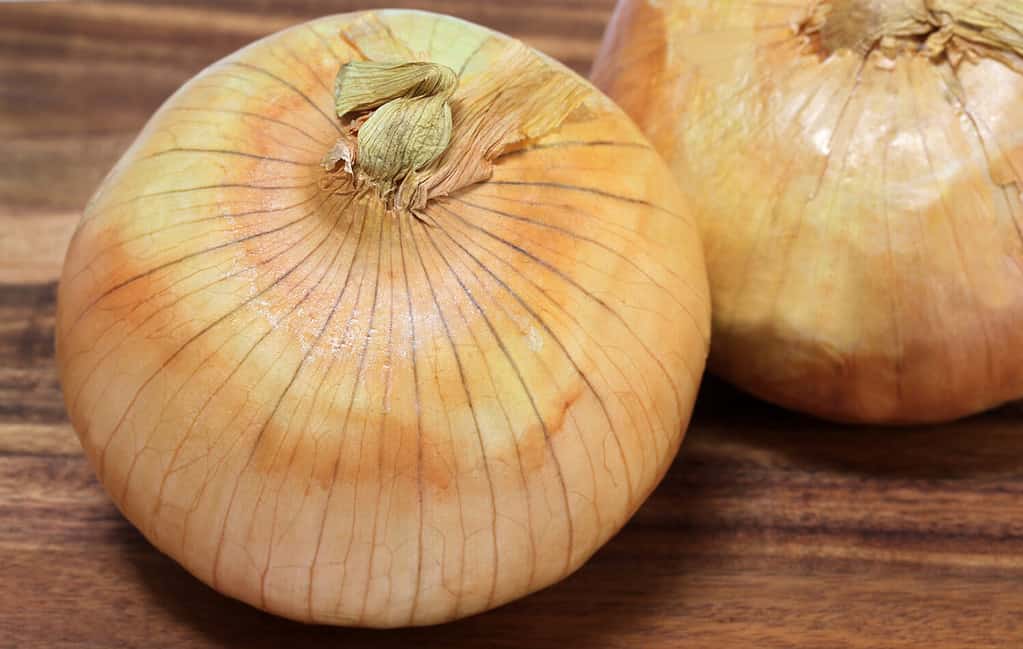
Onion’s natural defense mechanism may repel this bird from your tree.
©RoJo Images/Shutterstock.com
Another way to deter woodpeckers from drilling into your tree is by using the smell of onions. Woodpeckers may be overwhelmed by the smell of onions due to the onion’s natural defense mechanism, so if you put a piece of onion near the hole they’re drilling, they’ll likely stay away.
You can find onions at your local grocery store or farmer’s market. Cut off a small piece of onion and put it near the hole the woodpecker is drilling. For this method to be effective, you may need to replace the onion every few days, but this is a cheap and easy way to keep woodpeckers away from your trees or home.
Garlic

Place garlic cloves around your property or near areas where woodpeckers are known to be around
©KC Melete/Shutterstock.com
Garlic is a natural repellent for many pests, including woodpeckers. To use this method, place garlic cloves around your property or near areas where woodpeckers are known to be around. The pungent smell might deter them from coming near, and they should stay away from your property over time.
If you don’t have any fresh garlic on hand, don’t worry – you can also find garlic-based repellents at your local hardware or outdoor store. Just follow the directions on the packaging carefully, as too much of this potent smell can be just as unpleasant for humans as it is for woodpeckers.
Cayenne

Cayenne pepper is also called red pepper flakes.
©iStock.com/Amarita
Woodpeckers hate the smell of cayenne spray as the capsaicin in the peppers causes irritation. If you use this spray properly, it can deter woodpeckers from your property altogether.
Mix water and cayenne pepper powder in a 1:1 ratio to use this spray. Then put the mixture into a spray bottle and apply it liberally to areas where woodpeckers might be causing damage. Be sure to reapply after rain or whenever the site gets wet. You can find cayenne pepper powder at most grocery stores or online. It’s essential to get a pure powder without any additives, as these can reduce the effectiveness of the deterrent.
Summary Of The 10 Smells That Pesky Woodpeckers Absolutely Hate
| Rank | Smell |
|---|---|
| 1 | Peppermint |
| 2 | Catnip |
| 3 | Cinnamon |
| 4 | Lavender |
| 5 | Basil |
| 6 | Rosemary |
| 7 | Citronella |
| 8 | Onion |
| 9 | Garlic |
| 10 | Cayenne |
The photo featured at the top of this post is © Glass and Nature/Shutterstock.com
Thank you for reading! Have some feedback for us? Contact the AZ Animals editorial team.






